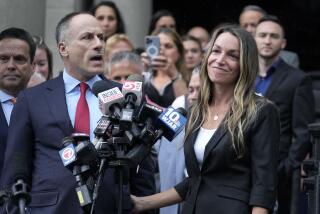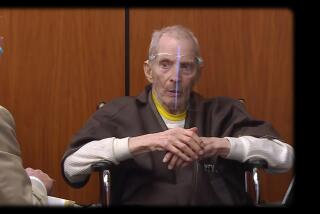Mistrial Ruled in Dana Point Murder Case
- Share via
SANTA ANA — Calling their ruling “a rare exception,” state appellate justices on Monday declared a mistrial in the troubled case against Richard K. Overton, whose sensational murder trial has been in a yearlong recess partly because his attorney suffered a severe depression.
In a 20-page opinion, a panel of three justices on the 4th District Court of Appeal in Santa Ana unanimously recommended a new trial for Overton on charges he killed his wife Janet L. Overton, a well-known Capistrano Unified School District trustee. She died, allegedly of cyanide poisoning, in January, 1988, after collapsing in the driveway of the couple’s Dana Point home.
Justices said there was a reasonable possibility that the attitudes of the jurors had become set during the unprecedented recess. Moreover, they held that Orange County Superior Court Judge David O. Carter should have ordered a mistrial when a psychiatrist informed him that Overton’s attorney, Robert D. Chatterton, would be unable to handle the case for at least six months.
“In reaching this result, we stress the extraordinary circumstances in this case,” wrote Justice Edward J. Wallin, who drafted the opinion. “It was, by all of the parties’ estimation, one of the most technically complex criminal cases in Orange County history. It is a murder case and the stakes are high.
“The delay (recommended by doctors) was to be at least six months. Although we appreciate the trial court’s concern over (taxpayer money already spent on) the trial, under these circumstances a mistrial was the only reasonable course of action.”
The court also granted Overton’s request to replace his defense attorney because of a dispute that threatened Chatterton’s ability to adequately represent him. Friction between the two developed over whether Overton had testified untruthfully about a piece of evidence before the trial was postponed.
Concurring in Wallin’s opinion were Justices Sheila Prell Sonenshine and David G. Sills.
Attorneys in the case estimate that it might take at least until September to dismiss the current jury, appoint new defense counsel and set a another trial date. Prosecutors also said Monday they will not appeal the ruling to the state Supreme Court and are preparing for a new trial.
Overton, a part-time college professor and computer consultant, is free on bail.
The decision “pretty much hit the issues which I thought were the strongest,” said Jack M. Earley, a veteran defense attorney handling Overton’s appeal for a mistrial. “There are a lot of things that can happen to a jury during a long delay. No matter which way the case goes, it makes the result unreliable for either side.”
Chatterton, who has put more than 2,000 hours into the Overton case, said the court’s ruling “was expected and seems to be the correct decision.” He added that he has recovered from his depression and is now in “excellent” health.
Judge Carter declined to comment on the opinion.
The recess in question began in July, 1992, after Chatterton told the judge that he had doubts about the truthfulness of his client on the witness stand. It created a potential conflict of interest for the attorney, because he might be forced to testify against Overton.
While Carter tried to resolve that issue, Chatterton slipped into a severe depression that doctors said was triggered by a chemical imbalance in his brain. The attorney was so concerned about his illness and his ability to represent Overton that he asked Carter to be relieved--a request that was denied.
Over the next seven months, Chatterton’s mental health set off 20 confidential court hearings to address legal attacks on the lawyer’s competency and to salvage a half-completed trial as well as months of preparation by attorneys.
Although they did not want to “impugn the diligence” and “good faith” of the trial court judge, justices ruled that Carter should have declared a mistrial when it became apparent that Chatterton was too ill to resume the trial for six months to a year.
The appeals court asserted that it would be difficult for jurors to keep an open mind after such a long hiatus between hearing the prosecution’s case and the defendant’s case. Justices cited examples of legal problems created by case delays, one of them as short as 11 days.
Courts must make sure “evidence is marshaled and presented in a timely fashion so the jury can evaluate it and reach a just result,” Wallin wrote. “A continuance is not an acceptable reaction to trial counsel’s incapacity if it will be so long as to presumptively result in prejudice.”
The Overton case was interrupted shortly after the prosecution had finished its case, which included expert testimony that Janet Overton had been poisoned. The defense intended to show she had not died from poisoning and had planned extensive expert testimony of its own to rebut the prosecution.
However, when Chatterton fell ill, he had done no more than solicit a denial from Overton that he had poisoned his wife. Before the proceedings were halted for good, the jury saw Overton being wheeled from the courtroom on a gurney after collapsing during a break in his testimony. Doctors later said he suffered an anxiety attack.
“The image left in the jurors’ minds was that the prosecution had presented substantial expert testimony of poisoning and Overton had wilted while denying it,” Wallin wrote.
The justices also said that, if the case had been allowed to continue, it would have amounted to a retrial anyway, because jurors would have had to have their memories substantially refreshed about the prosecution’s evidence when the trial resumed.
The appeals court described its ruling as “a rare exception” and cautioned that it was not defining how long a delay was necessary to justify declaring a mistrial.
In a second part of the their decision, justices concluded that Overton should have been allowed to fire Chatterton because of a dispute between the two over whether Overton had lied on the witness stand about a selenium rectifier presented as evidence. The simple device, found in electronic appliances, contains a potentially lethal chemical.
Prosecutors contend the rectifier is important to help prove their allegation that Overton tried to poison his wife with selenium before killing her with cyanide.
During his testimony, Overton said a selenium rectifier from his home that he had given to Chatterton before the trial was not the same as the one the attorney presented to the court during the trial.
In chambers with Carter, Chatterton said he was concerned about the implication that he had tampered with the evidence, by switching rectifiers. He was particularly worried that he would have to testify against his own client about the rectifier, creating a conflict of interest.
“Because of what Mr. Overton has done to me, I no longer want to represent him, I don’t believe I can effectively represent him,” Chatterton was quoted as saying. He also told Carter that he believed it was Overton who had switched rectifiers sometime after delivering one for him to keep at his law office.
Overton later told Carter he might have been mistaken in his testimony about the rectifier, but he maintained that his relationship with Chatterton was severely damaged and wanted to fire him. Carter denied the request.
“This scenario presents a classic case where an attorney’s loyalty to, and effort on behalf of, a client are threatened by the attorney’s own interest,” Wallin wrote. “By his own representations, Chatterton would be forced to ‘pull his punches.’ He would fail to represent Overton ‘as vigorously as he might have had there been no conflict.’ ”
Given the mistrial, Earley said on Monday that the defense is prepared to proceed with new scientific evidence suggesting that Janet Overton did not die of cyanide poisoning. He claimed that crime lab testing was incomplete, which made the results misleading.
“There are some facts I know and a lot of things I don’t know, but the one thing I do know is that I never poisoned Jan at any time,” Overton said Monday. “I guess that fact hasn’t been adequately communicated thus far. That’s not necessarily a criticism of Mr. Chatterton, that’s just the way things have gone. . . . I don’t bear any animosity toward him at all.”
Overton said he hopes the new defense evidence, which was uncovered during the hiatus, will sway the district attorney to re-evaluate the case and “recognize the basic fact that I didn’t poison her and this whole thing should be dropped.”
How Overton Case Unfolded
* Jan. 24, 1988: Janet L. Overton, a trustee of the Capistrano Unified School District, collapses in the driveway of the family’s Dana Point home and dies shortly thereafter. The cause of her death was listed as unknown.
* Oct. 1, 1991: Grand jury hands down indictment, charging Richard K. Overton with murdering his wife. He is arrested and later released on bail.
* June 9, 1992: Overton’s murder trial begins. Prosecutor tells jury that crime “took hatred to commit, and the evidence will show that this defendant had plenty of it to go around.”
* July 20, 1992: Prosecution rests; defense’s case begins. Overton takes witness stand, denies that he fatally poisoned his wife.
* July 22, 1992: Under contentious cross-examination, Overton admits he secretly spiked a previous wife’s coffee with old prescription drugs because he thought it was “a neat joke.”
* July 23, 1992: Overton’s attorney Robert D. Chatterton, in a confidential hearing in the judge’s chambers, accuses Overton of giving untrue testimony and asks to be removed from the case. Overton rushed to hospital after complaining of chest pains and dizziness.
* July 24, 1992: Trial halted by judge to resolve conflict between Chatterton and Overton. Testimony set to resume two months later. Jurors not told reason for the delay.
* Sept. 29, 1992: Jurors return for trial, are told that case will be postponed six more months. Judge does not tell jurors that Chatterton is suffering from clinical depression, forcing resumption of the case to be postponed.
* May 15, 1993: Attorneys in the case argue a defense motion for a mistrial because of the delay and the conflict between Chatterton and Overton.
* Aug. 2, 1993: Appellate court justices order a mistrial and Chatterton’s removal as Overton’s attorney.
Source: Times reports
More to Read
Sign up for Essential California
The most important California stories and recommendations in your inbox every morning.
You may occasionally receive promotional content from the Los Angeles Times.














